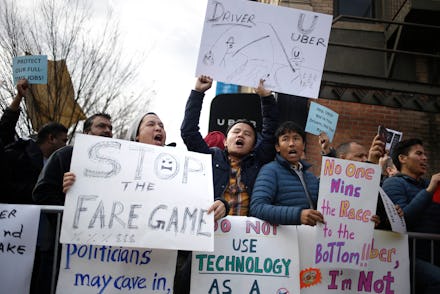Uber Drivers in NYC Want You to Know the Truth About Uber's Latest Round of Cuts

Hundreds of drivers were screaming at Uber's New York City headquarters on Monday morning. They said Uber was "killing" drivers, that what Uber was doing was like "slavery." One sign said that the "the gig economy = working class depression."
"Shame on Uber," they chanted for hours.
Uber cut its fares in the city by 15% last week, immediately catalyzing hundreds of Uber drivers to organize, protest and strike against the company. When prices go down, wages go down, and drivers say that Uber is using its paychecks to foot the bill. But Uber drivers aren't employees; they have no stake in the decision-making process and no form of collective bargaining. They find out about these cuts without warning or consultation, usually via email.
"You're going to sit down, and you're going to talk to us," one protester on a bullhorn shouted at the windows of Uber headquarters, as onlookers jeered at the employees inside. "We're going to hit you in your pocket. You thought Uber drivers were stupid, and dumb and idiots. You were wrong, my friend. You were wrong."
Uber has a playbook when it comes to slashing fares. Cuts like this latest round in New York have happened across the country and the world, any time Uber needs to undercut the competition or drive a sudden rush in customers. The company's rationale is that these cuts are good for everyone: passengers save money, and drivers end up making more because they never have to sit around idle; after all, everyone wants a cheap ride.
But every Uber driver who spoke to Mic at the event said the same thing: The decrease in fares means drivers are hustling harder, for far less money. And while customers benefit from reduced costs, seducing them away from yellow cabs and competitors like Lyft, those savings are coming out of drivers' pockets.
But every Uber driver who spoke to Mic at the event said the same thing: The decrease in fares means drivers are hustling harder, for far less money.
"What passengers should know is that we don't mind 15%, but Uber should also cut back on their commission," a driver named Bisram told Mic. "Their commission is almost 30%. So their commissions stand, but our fare drops. It's very off-balance."
Keep calm and Uber on: The company's internal math says the price cuts are working, bringing in a 20% increase in earnings for drivers per hour.
"This matches what happened the last time we reduced prices in New York; idle time decreased and net driver earnings increased," an Uber representative told Mic in a prepared statement. "We expect this positive trend to continue, but if for any reason the price cuts are not giving drivers more business and better earnings, we will consider changing them as we have in other cities."
Drivers say that this is totally out of touch with reality — that fares go down 15%, but since the drivers still pay for expenses like gas, those fares are coming right out of their earnings. The online Facebook group behind the organizing has run its own online polls on social media accounts where it's been organizing, with Uber drivers agreeing across the board that fares have largely gone down since the cuts.
"Uber's trying to monopolize the market, and they're becoming the same as the medallion owners before them."
"We don't know where these numbers are coming from," Farrukh Khamdamov, an Uber driver who helped organize the protest, told Mic. "We've said, 'We're real people with real answers, so show me your answers.'"
Uber also claims that since the cuts, trips to the outer boroughs increased by 20% overall compared to two weekends prior — 22% in the case of Queens, an all-time high. Bring those numbers up to the drivers and they just laugh, pointing out that the weekend they're using for comparison was Martin Luther King Jr. Day weekend.
"Long weekends are the slowest weekends in New York, and holidays always decrease our earnings while people are out on vacation," Khamdamov told Mic. "We've experienced those days while working yellow cabs before Uber."
Unionization: Uber drivers are now working to rack up the thousands of signatures required to establish a transit union, claiming that they only need a small percentage of Uber's 35,000 drivers to establish a collective bargaining unit like the recent drivers union in Seattle.
"City Hall has already given us a green light," Abdoul Diallo, a protest organizer with a group called the United Driver Network, told Mic. "We'll get the cards signed and pass the legislation."
In response to the threat of falling wages (which, remember, Uber insists isn't happening) Uber is offering a minimum hourly guarantee. But in order to qualify, Uber drivers have to accept 90% of all rides and only during certain shifts — the same kind of restrictions that drivers at the protest said were put on them by the taxi companies that Uber is bleeding dry.
"Uber's trying to monopolize the market, and they're becoming the same as the medallion owners before them," Khamdamov told Mic.
Even as the protesters chanted "shame on Uber," "Drivers united can never be defeated" and a few disparate fuck-yous, popping open the Uber app right there in Queens showed a dozen cars circling the area surrounding the protest. At any given moment, a ride was only a few minutes away.